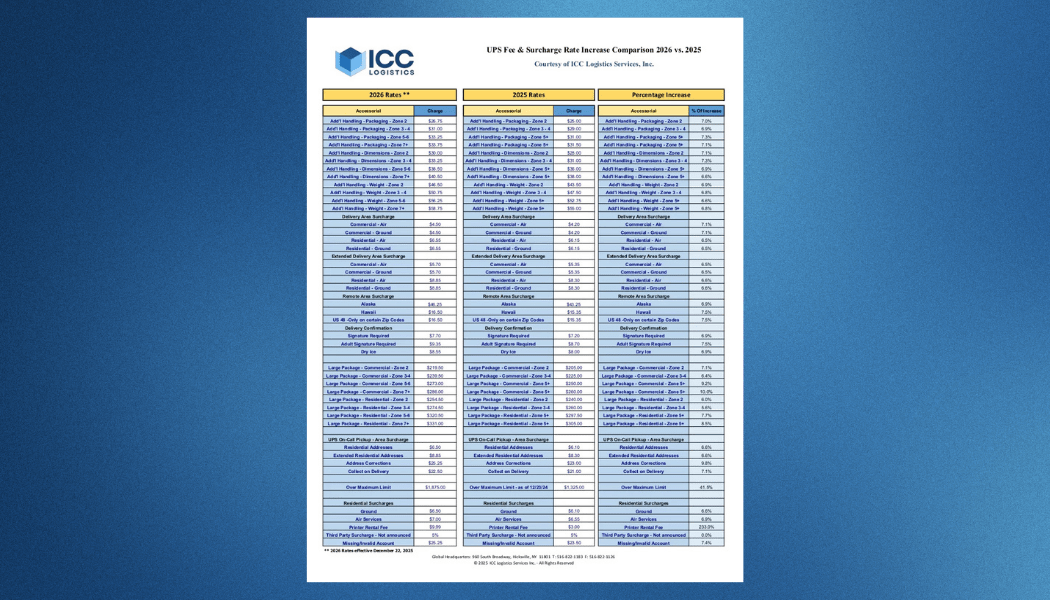Most shippers believe that if they tender a shipment to a domestic freight carrier and that shipment is lost or totally damaged in transit, they would receive full compensation from the freight carrier for that loss. In fact, many years ago domestic freight carriers were required to compensate shippers for the “full actual loss” for a shipment that was either lost or totally destroyed while in the carrier’s possession and carrier liability had been proven. Well, that was then and this is now.
Domestic freight carriers for years now have been limiting their liability by publishing various limits of liability within their rules publications. These liability limits vary from carrier to carrier and it is incumbent on all shippers to have a complete understanding of their carrier’s liability limitations so they can avoid the loss of significant dollars should a loss or damage occur to their freight while in transit.
One such example is a limit of liability for “used machinery.” One shipper we know shipped a large computerized fabric cutting machine back to the manufacturer for minor repairs. The carrier unfortunately significantly damaged the machine while in transit. When the shipper filed their claim for the damage it was for several hundred thousands of dollars. They were completely caught off guard when the carrier sent them a check for $120.00 claiming that shipments of “used machinery” were subject to a limited liability of $0.10 per pound. The shipment weighed 1200 pounds so that’s how the carrier calculated the “whopping” claim payment.
That shipper certainly used poor judgement in tendering the shipment to a carrier who published the liability limitation, without seeking additional cargo insurance coverage. In today’s fast-paced business climate, shippers are constantly seeking out the least cost carrier. And while that makes perfect sense, how diligent are those same shippers in researching the various carriers’ liability limits, just in case there is a loss or damage to their shipments. Not very often we believe.
Of course shippers can obtain additional insurance coverage from the freight carriers for an additional fee, but knowing when to purchase that additional insurance is an important key to the carrier selection process.
On the other side of the coin, there are shippers that insure virtually all of their shipments with their freight carriers at great additional expense. Well, if that shipper has limited claims for loss and damage, perhaps they should have opted to “self-insure” instead of paying a premium on every shipment they make.
Also, for the most part, paying freight carriers’ directly for additional insurance is typically the most expensive insurance costs a shipper will experience. It may very well make sense for the shipper to obtain a separate cargo insurance policy from their business insurance company to cover them for any losses they may incur. Companies must perform an insurance “sanity check” to make sure they make the most logical decision on what insurance provides the most comprehensive coverage for the least possible cost.
In addition to carriers limiting their liability, all carriers publish a list of items they will not pick up for transport. These items are usually referred to as Prohibited or Restricted Articles and each and every freight carrier publishes their own distinct list of such restricted items.
These items almost always include, US currency, precious metals, original works of art, live animals, hazardous materials, fireworks, household goods, etc., you get the picture. It is incumbent on all shippers to know in advance if their carrier prohibits transporting particular products they intend to ship with that carrier.
To put this into perspective here is a real life example to chew on: Recently a shipper of lighting fixtures advised us that they made a shipment to a customer by a certain freight carrier. The carrier pickup up the shipment on the date specified, but then lost the entire shipment, (not sure how that happens, but apparently it did.) The shipper immediately filed a claim for the loss of the shipment and the claim amount was in excess of $6,000.00.
The carrier replied to the claim by sending a letter of declination to the shipper claiming the shipper did not have “Prior Authorization” to make the shipment in the first place. The carrier referred the shipper to a rule it published which states “the following items can be picked up but REQUIRE written approval by carrier prior to pick up.” The rule is very specific and states that written approval can only be given on a form authorized and signed by a member of the carrier’s regional operations management team.
The carrier then proceeded to tell the shipper the lighting fixture covers it shipped to its customer for the fixtures the customer ordered were a “custom item, not typically maintained in inventory and with no other practical use or market value beyond the immediate intended use.” Since the shipper did not obtain prior authorization to ship these goods, the carrier refused to pay the claim and the shipper was out $6,000.00.
The real concern here for any shipper thinking of using this specific carrier, is the carrier’s own definition of “custom Items.” In our opinion, any item that is in any way customized, such as wearing apparel with company or team logos, any advertising material created for specific purposes, any food product which is labeled for a specific customer, any item that is cut to a specific size for a specific customer, (and the list goes on and on), can be considered a custom item and the carrier merely wipes it’s hands of any liability whatsoever and that should be a major concern for all shippers.
How well does your company vet it’s carriers to see if there are any similar liability restrictions that may come back to haunt them? This should be a wake-up call for all shippers. Shippers must make sure they understand all liability limitations published by the carriers they utilize. Shippers that utilize freight brokers and Third Party Logistics providers need to understand that each different carrier they utilize will have its own unique liability rules and regulations. This is truly a “Caveat Emptor” scenario….translation, “Buyer Beware!”



 to receive our FREE white papers:
to receive our FREE white papers: